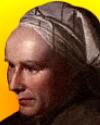 (source)
(source)
|
William Cowper
(26 Nov 1731 - 25 Apr 1800)
British poet whose works mingle quiet meditation with descriptions of rural life and natural scenery.
|
Science Quotes by William Cowper (11 quotes)
A fool must now and then be right, by chance
— William Cowper
In 'Conversation' (published 1782). In William Cowper and Humphrey Sumner Milford (ed.), The Complete Poetical Works of William Cowper (1905), 92.
A shallow brain behind a serious mask,
An oracle within an empty cask.
An oracle within an empty cask.
— William Cowper
In 'Conversation', Table Talk: And Other Poems (1817), 155.
Fires from beneath, and meteors from above,
Portentous, unexampled, unexplain'd,
Have kindled beacons in the skies; and th' old
And crazy earth has had her shaking fits
More frequent, and foregone her usual rest.
Is it a time to wrangle, when the props
And pillars of our planet seem to fail,
And nature, with a dim and sickly eye,
To wait the close of all?
Alluding the meteors of 17 Aug 1883.
Portentous, unexampled, unexplain'd,
Have kindled beacons in the skies; and th' old
And crazy earth has had her shaking fits
More frequent, and foregone her usual rest.
Is it a time to wrangle, when the props
And pillars of our planet seem to fail,
And nature, with a dim and sickly eye,
To wait the close of all?
Alluding the meteors of 17 Aug 1883.
— William Cowper
'The Time-Piece,' Task, Book ii, lines 58-66. In William Cowper, Henry Francis Cary, The Poetical Works of William Cowper (1863), 52-53.
Grief is itself a med’cine.
— William Cowper
'Charity' (published 1782). In William Cowper and Humphrey Sumner Milford (ed.), The Complete Poetical Works of William Cowper (1905), 79.
How happy … does the sagacious investigator of nature seem, whose fancy is ever employed in the invention of hypotheses, and his reason in the support of them!
— William Cowper
From Letter (29 Sep 1783) to Rev. William Unwin, collected in William Cowper and William Hayley (ed.), The Life, and Posthumous Writings, of William Cowper (1803), Vol. 3, 196.
Knowledge and wisdom, far from being one,
Have ofttimes no connection. Knowledge dwells
In heads replete with thoughts of other men,
Wisdom in minds attentive to their own.
Knowledge is proud that he has learned so much,
Wisdom is humble that he knows no more.
Have ofttimes no connection. Knowledge dwells
In heads replete with thoughts of other men,
Wisdom in minds attentive to their own.
Knowledge is proud that he has learned so much,
Wisdom is humble that he knows no more.
— William Cowper
The Task, Book 6, 'The Winter Walk at Noon' (published 1785). In William Cowper and Humphrey Sumner Milford (ed.), The Complete Poetical Works of William Cowper (1905), 221.
Some drill and bore
The solid earth, and from the strata there
Extract a register, by which we learn,
That he who made it, and reveal'd its date
To Moses, was mistaken in its age.
The solid earth, and from the strata there
Extract a register, by which we learn,
That he who made it, and reveal'd its date
To Moses, was mistaken in its age.
— William Cowper
The Task and Other Poems, Book III, The Garden (1785). In John D. Baird and Charles Ryskamp (eds.), The Poems of William Cowper (1995), Vol. 2, 1782-1785, 166-7.
The vortices of Descartes, gave way to the gravitation of Newton... One generation blows bubbles, and the next breaks them.
— William Cowper
From Letter (29 Sep 1783) to Rev. William Unwin, collected in William Cowper and William Hayley (ed.), The Life, and Posthumous Writings, of William Cowper (1803), Vol. 3, 196.
The heart may give a lesson to the head,
And Learning wiser grow without his books.
And Learning wiser grow without his books.
— William Cowper
In Hialmer Day Gould, New Practical Spelling (1905), 14.
To trace in Nature's most minute design
The signature and stamp of power divine.
...
The Invisible in things scarce seen revealed,
To whom an atom is an ample field.
The signature and stamp of power divine.
...
The Invisible in things scarce seen revealed,
To whom an atom is an ample field.
— William Cowper
'Retirement' in William Cowper, Robert Southey, William Harvey, The Poetical Works of William Cowper (1854), 220.
Words learned by rote a parrot may rehearse,
But talking is not always to converse;
Not more distinct from harmony divine,
The constant creaking of a country sign.
But talking is not always to converse;
Not more distinct from harmony divine,
The constant creaking of a country sign.
— William Cowper
 In science it often happens that scientists say, 'You know that's a really good argument; my position is mistaken,' and then they would actually change their minds and you never hear that old view from them again. They really do it. It doesn't happen as often as it should, because scientists are human and change is sometimes painful. But it happens every day. I cannot recall the last time something like that happened in politics or religion.
(1987) --
In science it often happens that scientists say, 'You know that's a really good argument; my position is mistaken,' and then they would actually change their minds and you never hear that old view from them again. They really do it. It doesn't happen as often as it should, because scientists are human and change is sometimes painful. But it happens every day. I cannot recall the last time something like that happened in politics or religion.
(1987) -- 


